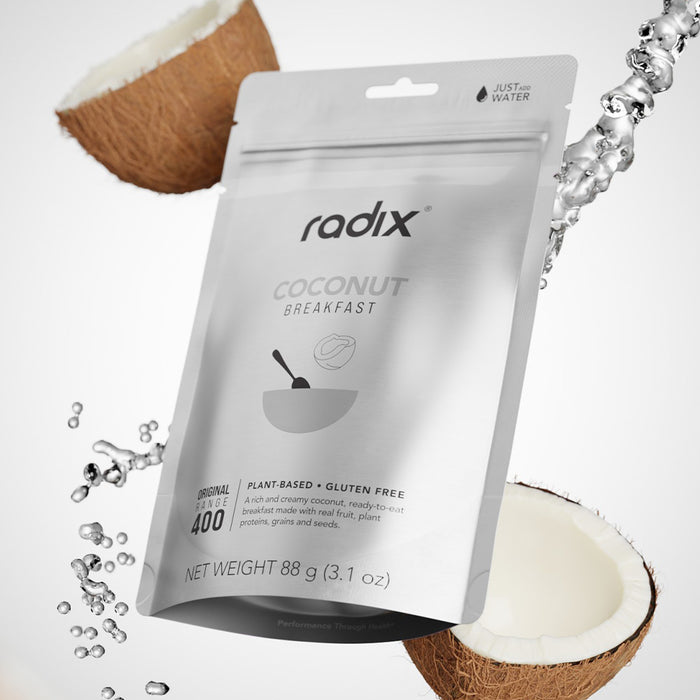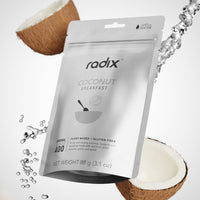Triathlon races consist of three disciplines; swim, bike and run. Triathlon covers Sprint, Olympic, half ironman and full ironman distance, these different distances can range in duration from 90 minutes to over 3 hours. Each distance has different nutritional needs and challenges. In the context of this article, we will be addressing nutrition recommendations for Sprint (750 m swim, 20 km bike and 5 km run) and Olympic (1.5 km swim, 40 km bike and 10 km run) distance triathlons.
Nutritional challenges for Triathlon?
Training for three disciplines means that multiple training sessions per day may be required. Given the frequency and duration of training it is important that nutrition is optimised to match nutrient demands to ensure appropriate adaptation to training, improvements in performance and reduce the risk of injury and illness.
The energy needs of triathletes can make it challenging to consume sufficient amounts of food, particularly if you have other work or school commitments. On top of this potential concerns about gastrointestinal complaints and suppression of appetite around training and racing can further impact nutritional intakes.
Nutrition for Triathlon.
Carbohydrates
Carbohydrates are important for fuelling both your races and training. Carbohydrate intakes should be modified to meet your daily and weekly training demands for example on a heavy training day you should consume 6-12 grams of carbohydrates per kg of body weight, whereas on lighter training or rest days you could consume less carbohydrate about 3-5 grams per kg of body weight [1].
For a 70 kg triathlete:
On a heavy day you would consume between 6*70 = 420 g and 12*70 = 840 g of carbohydrate.
On a light training day you could consume 3*70 = 210 g to 5*70 = 350 g of carbohydrate.
For races and training sessions you need to ensure you have fuel yourself before and during exercise and then replace your energy (glycogen) stores after exercise so you are ready for your next training session or race.
Fuelling up before racing or training is important especially if training in the morning as your energy (glycogen stores) deplete overnight and research has shown that performance is improved following carbohydrate ingestion [2,3].
it is recommended that triathletes consume 1-4 grams of carbohydrates per kg of bodyweight, 1-4 hours before competition to ensure glycogen stores are full, improving performance and minimise the risk of gastrointestinal distress [1]. Timing can be manipulated depending on your race or training time, if it’s an early start you may want to eat closer to the start time. If you have trouble eating before exercise then drinking your carbohydrates maybe better.
For training or races longer than 60 minutes you should have carbohydrate during exercise. The amounts recommended range from 30-90 g per hour [1]. If you do not usually consume carbohydrate during exercise then start at the lower end and gradually increase the amount you consume.
Think of the post-training or race period as preparation for the next training session. You need your body to recover and adapt to the exercise you have just completed in order to improve. Restocking your glycogen stores is important therefore aim to eat 1.0-1.2 grams of carbohydrates per kg of body weight to optimise muscle and liver glycogen resynthesis [1]. Not consuming carbohydrates following exercise means stress hormones remain elevated, can impair immune function, reduce training output, and cause burnout [4].
Your race nutrition plan should be practiced in training to ensure there are no nasty surprises on race day.
Protein
Although, protein is often associated with body builders it is important for all athletes. Protein is not only important for muscle repair and growth but it plays an important role in many body systems including the immune system, hormones and enzymes which are required for muscle contraction [1]. It is generally recommended that triathletes consume 1.3-1.8 grams of protein per kilogram of body weight per day [5].
For a 70 kg athlete this is 1.3*70 = 91 g to 1.8*70 = 126 g.
Ideally protein should be consumed in every meal and snack roughly 20-30 g consumed five times per day, with 20-30 g of protein being ingested soon after exercise [1].
It should be noted that not all proteins are created equal, in fact proteins are made up of amino acids and we require all amino acids for optimal health and performance [5]. Proteins which contain all the amino acids are said to be higher quality which is measured by Digestible Indispensable Amino Acids Score (DIAAS). So when choosing a protein following exercise look for a DIAAS greater than 1.00 [6]. When consuming protein in order to ensure you obtain a good mix of amino acids make sure you eat from a variety of protein sources.
Energy
The training load for triathletes is high which means energy needs are high. Not meeting your energy demands can have negative impacts on both health and performance. If you do not eat sufficient energy over time you can develop Relative Energy Deficiency in Sport (REDS), which negatively effects almost all systems in the body (reproductive, cardiovascular, musculoskeletal, immune, endocrine) [7]. Therefore, make sure you are fuelling appropriately around training and competition (before, during and after), as well as eating regularly throughout the day from a variety of food sources. However, if you are a female and you do not have a regular menstrual cycle (bleeding every 23 to 35 days), you have recurring injuries and/or illness that you cannot recover from you should seek medical help, as these are potential signs of REDS.
Micronutrients
Micronutrients are substances that the body requires in very small quantities, yet if insufficient amounts are consumed the body is unable to function properly. Some micronutrients (iron, folate, vitamin B12) are important for the red blood cells which transport of oxygen around the body [8]. Other micronutrients play an important role in our immune system and can act as antioxidants (Vitamin C, E and K) which remove harmful free radicals which form during exercise. It should be noted that supplementing with large volumes of antioxidants on a daily basis is not recommended as it can impair adaptation to training but consuming antioxidants from foods is beneficial for health and recovery from exercise [8]. Other micronutrients (Vitamin D and Calcium) are important for bone health, with all micronutrients playing some key role within the body it is important that adequate amounts of micronutrients are consumed. Micronutrients are found alongside protein and carbohydrates in fruits, vegetables, whole-grains, dairy and dairy alternatives so consuming a diet from all of the food groups is important.
Microbiome
Gastrointestinal discomfort is one of the most common issues experienced during competition [9]. There are a number of potential reasons why this could occur including changes in blood flow away from the gastrointestinal tract, inappropriate fuelling, or due to the gut microbiome [9].
A healthy gut microbiome can optimise systems that prevent inflammation, reducing discomfort and allowing you to perform without interruption. Diet can influence the gut microbiome, including an appropriate array of prebiotics and a type of fibre that acts as food for the microbiome can improve the gut microbiome. An abundance of healthy bacteria in the gut and reduce gastrointestinal issues during endurance exercise [10].
Hydration
Fluid needs vary substantially between individuals and training sessions depending on the environment, exercise intensity and duration, genetics and training status [1]. Both not drinking enough and drinking too much can lead to health and performance decrements. Weight loss or gain during exercise is likely mainly due to water losses (sweat) or gain (drinking) [1]. You should aim to start exercise well hydrated i.e. be able to urinate and urine should be a pale yellow colour. During exercise weigh yourself before and after you can use these values to check your hydration status during exercise. You should not gain weight during exercise and should aim to lose no more than 1-2% of your initial body weight during exercise.
For a 70 kg triathlete you should not lose more than 70*1% = 0.7 kg to 70*2% = 1.4 kg.
Radix solution
At Radix, we strive to create the best quality products for the best possible performance. With the principles of athletic performance in mind, our Radix Nutrient Architecture (RNA) Index helps us to increase the density of 80+ nutrients, designed to support athletes’ bodies like yours. Sourced from all-natural, quality ingredients, our meals are made to provide the key elements of nutrition to ensure your body can perform at its absolute best.
References:
-American Dietetic Association, Dietitians of Canada, American College of Sports Medicine, et al. (2009). American College of Sports Medicine position stand. Nutrition and athletic performance. Med Sci Sport Ex. 41(3):709-731.
-Neufer, PD, Costill, DL, Flynn, MG et al. (1987) Improvements in exercise performance: effects of carbohydrate feedings and diet. J Appl Physiol. 62, 983–988.
-Chryssanthopoulos, C, Williams, C, Nowitz, A et al. (2002) The effect of a high carbohydrate meal on endurance running capacity. Int J Sport Nutr Exerc Metab. 12, 157–171.
-Nieman, DC, Mitmesser, SH. (2017). Potential Impact of Nutrition on Immune System Recovery from Heavy Exertion: A Metabolomics Perspective. Nutrients. 18;9(5):513.
-Phillips, SM, Van Loon, LJ. (2011). Dietary protein for athletes: from requirements to optimum adaptation. J Sports Sci. 29 Suppl 1:S29-38.
-FAO (2013). Dietary protein quality evaluation in human nutrition: Report of an FAO expert consultation. Food and Nutrition Paper, 92, 1–66.
-Mountjoy, M, Sundgot-Borgen JK, Burke LM, et al. (2018). IOC consensus statement on relative energy deficiency in sport (RED-S): 2018 update. British Journal of Sports Medicine. 52:687-697.
-Burke, L. and Deakin, V. (2021). Clinical Sports Nutrition 6th edition. McGraw Hill / Australia.
-Coleman, N. (2019). Gastrointestinal Issues in Athletes. Current Sports Medicine Reports 18(6):p 185-187.
-Mach, N, Fuster-Botella, D. (2017). Endurance exercise and gut microbiota: A review. J Sport Health Sci. 6(2):179-197.



























































































